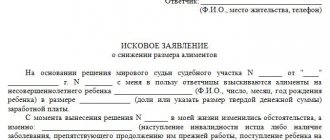Criminal Procedure Code of the Russian Federation:
Article 31. Jurisdiction of criminal cases
1. The magistrate has jurisdiction over criminal cases of crimes for which the maximum penalty does not exceed three years of imprisonment, with the exception of criminal cases of crimes provided for in Articles 107, part one, 108, 109, parts one and two, 116.1, 134, 135, 136 part one, 146 part one, 147 part one, 151.1, 157, 158.1, 170, 170.2, 171 part one, 171.1 part one, three and five, 171.3 part one, 171.4, 171.5, 174 part one and two, 174.1 part one and second, 177, 178 part of the first, 183 part of the first, 185, 191 part of the first, 191.1 parts of the first and second, 193 part of the first, 193.1 part of the first, 194 part of the first, 195 parts of the first, second and third, 198, 199 part of the first , 199.1 part one, 199.2 part one, 199.3, 199.4 part one, 200.1, 201 part one, 202 part one, 205.6, 207, 207.1, 207.2 part one, 212 part three, 215 part one, 215.1 part one, 215.3 part one , 215.4 part one, 216 part one, 217 part one, 217.2 part one, 219 part one, 220 part one, 223 part four, 225 part one, 228 part one, 228.2, 228.3, 234 parts one and four, 234.1 part one , 235 part one, 236 part one, 237 part one, 238 part one, 239, 243 part one, 243.1, 243.2 part one, 243.3 part one, 243.4 part one, 244 part two, 247 part one, 248 part one, 249 , 250 parts first and second, 251 parts first and second, 252 parts first and second, 253 parts first and second, 254 parts first and second, 255, 257, 259, 262, 263 parts first, 264 parts first, 264.1, 264.2 , 266 part one, 270, 271, 272 part one, 273 part one, 274 part one, 285.1 part one, 285.2 part one, 286.1 part one, 287 part one, 288, 289, 292, 293 part one and one.1 , 294 parts first and second, 296 parts first and second, 297, 298.1, 301 parts first, 302 parts first, 303 parts first and second, 306 parts first and second, 307 parts first, 309 parts first and second, 311 parts first , 314.1, 315 part one, 316, 322 part one, 323 part one, 327 parts one - three, 327.1 part one and 328 of the Criminal Code of the Russian Federation.
2. The district court has jurisdiction over criminal cases of all crimes, with the exception of the criminal cases specified in parts one (regarding the jurisdiction of criminal cases by the magistrate) and three of this article.
3. The Supreme Court of the Republic, a regional or regional court, a court of a federal city, a court of an autonomous region, a court of an autonomous district, a district (naval) military court have jurisdiction over:
1) criminal cases of crimes provided for in articles 105 part two, 131 part five, 132 part five, 134 part six, 228.1 part five, 229.1 part four, 277, 281 part three, 295, 317, 357 of the Criminal Code of the Russian Federation, for with the exception of criminal cases of crimes committed by persons under the age of eighteen, and criminal cases in which life imprisonment or the death penalty cannot be imposed as the most severe form of punishment in accordance with the provisions of part four of Article 62, part four of Article 66 and part four of article 78 of the Criminal Code of the Russian Federation, as well as criminal cases of crimes provided for in articles 126 part three, 209, 210 part four, 210.1, 211 parts one - three, 212 part one, 227, 275, 276, 278, 279, 281 parts one and two, 353 - 356, 358, 359 parts one and two, 360 of the Criminal Code of the Russian Federation;
2) criminal cases against a member of the Federation Council, a deputy of the State Duma, a judge of the Constitutional Court of the Russian Federation, a judge of a federal court of general jurisdiction or a federal arbitration court, a magistrate, a judge of a constitutional (statutory) court of a constituent entity of the Russian Federation at their request submitted before the start of the trial proceedings;
3) criminal cases, the materials of which contain information constituting a state secret.
4. Lost force on January 1, 2013. — Federal Law of December 29, 2010 N 433-FZ.
5. The garrison military court considers criminal cases of all crimes committed by military personnel and citizens undergoing military training, with the exception of criminal cases within the jurisdiction of higher military courts.
6. The district (naval) military court has jurisdiction over the criminal cases specified in part three of this article in relation to military personnel and citizens undergoing military training, as well as criminal cases transferred to the said court in accordance with parts four to seven of Article 35 of this Code.
6.1. The 1st Eastern District Military Court, the 2nd Western District Military Court, the Central District Military Court and the Southern District Military Court have jurisdiction over:
1) criminal cases specified in parts three and six of this article;
2) criminal cases of crimes provided for in articles 205, 205.1, 205.2, 205.3, 205.4, 205.5, 206, 211, part four, 361 of the Criminal Code of the Russian Federation;
3) criminal cases of crimes provided for in Articles 277, 278, 279 and 360 of the Criminal Code of the Russian Federation, if their commission is associated with terrorist activities;
4) criminal cases of crimes, when assigning punishment for which the aggravating circumstance provided for in paragraph “p” of part one of Article 63 of the Criminal Code of the Russian Federation must be taken into account.
7. Lost power. — Federal Law of December 27, 2009 N 346-FZ.
7.1. If cases of crimes committed by a group of persons, a group of persons by prior conspiracy, an organized group or a criminal community are within the jurisdiction of a military court in relation to at least one of the accomplices, and the separation of a criminal case in relation to the remaining persons is impossible, these cases in relation to all persons are considered by the appropriate military court.
8. Military courts located outside the territory of the Russian Federation, when considering criminal cases in cases provided for by federal constitutional law, are guided by this Code.
9. The district court and the military court of the appropriate level make, during pre-trial proceedings in a criminal case, the decisions specified in parts two and three of Article 29 of this Code.
10. The jurisdiction of a civil claim arising from a criminal case is determined by the jurisdiction of the criminal case in which it was brought.
Return to the table of contents of the document: Criminal Procedure Code of the Russian Federation in the current edition
Judicial system
The Law of the Russian Federation “On the Judicial System of the Russian Federation” clearly establishes the judicial system, i.e. establishes the types of courts operating on the territory of the state, and also establishes their competence.
Thus, Article 4 of this regulatory legal act states that the system of courts of the Russian Federation consists of federal courts, as well as magistrates' courts of the constituent entities of the Russian Federation.
Federal courts have their own level system:
- district courts;
- supreme courts of each territory, region, republic, as well as equivalent courts of large cities with federal status (Moscow, St. Petersburg, etc.);
- Supreme Court of the Russian Federation.
There are separate military courts, which are designed to consider cases of a narrow category (military topics). They have equal status to district courts or supreme courts of local significance (depending on their level).
The concept and types of jurisdiction of criminal cases in the Russian Federation
Jurisdiction in criminal proceedings, as well as in civil proceedings, is divided into the following types:
- generic;
- territorial;
- interconnected.
Generic jurisdiction makes it possible to differentiate the procedure for considering certain categories of civil and criminal cases between authorities at different levels, i.e. establishes the procedure according to which a decision is made to refer a criminal case to a particular body under jurisdiction.
Neither investigative bodies when sending cases, nor the courts themselves can independently decide to send cases to another body, unless otherwise provided by law. Thus, in the Constitution of the country there is a clause (Article 47), according to which no one can be forcibly deprived of the right to trial in court according to the jurisdiction available in the country.
Depending on the territory in which the controversial situation takes place (the commission of a crime), the court to which the case materials will be submitted for consideration will depend. This is called territorial jurisdiction . In civil proceedings, the claim is sent to the court in the territory of whose jurisdiction the defendant (the organization against which the claims are made) resides. There are both general territorial jurisdiction, and alternative (the plaintiff has the right to choose a court in accordance with the rules enshrined in the law), exclusive (depending on the type of claim), contractual (the parties can change the court by agreement).
Interconnected jurisdiction involves consideration of a new case (claim) in the same court and by the same judge who is considering a previously directed criminal case (filed claim), regardless of territoriality, in a single process after their connection. This procedure is designed to save government money and time costs for the judiciary.
Basic principles
If government agencies fail to comply with the rules of jurisdiction enshrined in the law, negative consequences may occur.
The legality of justice should be based on the following principles:
- The court accepts only those cases that are within its jurisdiction.
- A decision made by a court in violation of the rules of jurisdiction is declared invalid.
- The parties to the proceedings may request that the case be referred to the competent authority.
- The case in the court where it was received must be considered from beginning to end, with the exception of the case of filing claims.
- When sending a case to court, it is necessary to take into account both the generic and territorial jurisdiction of criminal cases in criminal proceedings.
- A judge who has received a case for proceedings and decides that it is not within the jurisdiction of the court to which it was received must be redirected to the competent authority.
- Disagreements and disputes between judicial authorities regarding the determination of the jurisdiction of certain cases are not allowed.
More information can be obtained by asking questions in the comments to the article.
Powers of the magistrate before the start of the trial
Chapter 33 of the Code of Criminal Procedure of the Russian Federation establishes the general powers of a judge before a court hearing, as well as the procedure for carrying out preparatory actions for a court hearing, which also apply to proceedings before a magistrate.
The powers of the magistrate before the start of the trial differ depending on the criminal case in which they are exercised: in a private prosecution case or in a criminal case with an indictment. In a criminal case with an indictment received by the court, the magistrate carries out preparatory actions and makes decisions in the general manner established by Chapter 33 of the Code of Criminal Procedure of the Russian Federation, without any special features.
In accordance with Art. 228 of the Code of Criminal Procedure of the Russian Federation, in a criminal case with an indictment, the magistrate must find out the following questions in relation to each of the accused:
- whether the criminal case is within the jurisdiction of this court;
- whether copies of the indictment or indictment have been served;
- whether the preventive measure is subject to election, cancellation or change, and whether the period of prohibition of certain actions provided for in paragraph 1 of part six of Article 105.1 of the Code of Criminal Procedure of the Russian Federation, the period of house arrest or the period of detention is subject to extension;
- whether the submitted requests and complaints are subject to satisfaction;
- whether measures have been taken to ensure the execution of the penalty in the form of a fine;
- whether measures have been taken to ensure compensation for damage caused by the crime or possible confiscation of property, and whether the period of seizure imposed on property established in accordance with Part 3 of Art. 115 Code of Criminal Procedure of the Russian Federation;
- Are there any grounds for holding a preliminary hearing provided for in Part 2 of Art. 229 of the Code of Criminal Procedure of the Russian Federation.
After resolving these issues and depending on the answers to them, the magistrate makes one of the decisions provided for in Art. 227 Code of Criminal Procedure of the Russian Federation:
- on the direction of the criminal case according to jurisdiction;
- to schedule a preliminary hearing;
- on the appointment of a court hearing, on which a decision is made.
If there are no grounds for sending the case to jurisdiction or for scheduling a preliminary hearing, the magistrate makes a decision to schedule a court hearing in accordance with the rules of Art. 231 of the Code of Criminal Procedure of the Russian Federation and carries out other preparatory actions.
In the case of a private prosecution case, a significant role characterizing the preparatory actions of the magistrate for the court hearing is played by the need to take into account the will of the victim in order to bring the opposing party to court.
In accordance with Part 2 of Art. 319 of the Code of Criminal Procedure of the Russian Federation, the magistrate, at the request of the parties, has the right to assist them in collecting evidence that cannot be obtained by the parties independently. The forms in which the magistrate can assist the parties in collecting evidence are not directly established by law.
At the request of the parties, from the moment the application is accepted for its proceedings, the magistrate has the right to assist them in collecting evidence. Forms of assistance to the parties may include requests and instructions to the bodies of inquiry and preliminary investigation.
The magistrate must notify the other party about the provision of assistance to one of the parties in collecting evidence, familiarizing it with the decision to carry out certain procedural actions.
The magistrate sends demands for the provision of objects and documents with the help of which information relevant to the case can be established. The assistance of magistrates to the parties in collecting evidence in cases where it is carried out at the request of the parties does not contradict the principle of adversarial law. In this case, the magistrate does not carry out accusatory activities; he only helps the parties overcome obstacles that deprive them of the opportunity to independently collect the necessary evidence in a private prosecution case.
Simultaneously with the acceptance of a statement in a private prosecution case, the magistrate may apply to the defendant in accordance with Art. 111 of the Code of Criminal Procedure of the Russian Federation measures of procedural coercion in the form of: obligations to appear; drive; temporary removal from office; seizure of property.
It is prohibited at this stage to choose a preventive measure - detention.
Having accepted the application for consideration, the magistrate notifies the applicant and the person against whom the application was filed. If there are grounds for scheduling a court hearing, the magistrate, within 7 days from the date of receipt of the application to the court, performs the following actions: calls the person against whom the application was filed; introduces him to the materials of the criminal case; hands over a copy of the submitted application; explains the rights of the defendant at the court hearing, provided for in Article 47 of the Code of Criminal Procedure of the Russian Federation; finds out who, in the opinion of this person, needs to be called to court as witnesses for the defense, about which a signature is taken from him.
If there are several defendants in the case, then the case materials must be presented for review, and a copy of the statement must be given to each of them.
If the person against whom the application was filed fails to appear in court, a copy of the application explaining the rights of the defendant, as well as the conditions and procedure for reconciliation of the parties, is sent to the defendant by mail.
Another feature of private prosecution proceedings is the possibility of their termination due to reconciliation of the parties. The responsibility for explaining the possibility of reconciliation rests with the magistrate.
Reconciliation should be understood as the activity of the accused and the victim aimed at overcoming the consequences of the crime. Reconciliation is a two-way act that requires the consent of not only the victim, but also the accused. At the same time, in order to terminate a criminal case of private prosecution due to the reconciliation of the parties, the law does not require the perpetrator to compensate for damage or eliminate the harm caused to the victim by the crime.
The role of the magistrate in the reconciliation procedure of the parties is only to explain to them the possibility and consequences of reconciliation. In an adversarial criminal process, the role of the judge in the process of reconciliation of the parties cannot be active; he does not have the right to persuade the parties to reconcile, since this may raise doubts about the impartiality of the magistrate. Therefore, during the conciliation procedure, the judge should only explain to the parties their right to reconciliation and the consequences of exercising this right for both parties. For the victim, such a consequence will be the impossibility of re-applying to the court with a request to prosecute the same person and on the same charges, and for the defendant - the termination of the case and criminal prosecution on non-rehabilitating grounds and the possibility of bringing a civil claim against him in civil proceedings.
Since reconciliation is a bilateral act, to refuse to initiate a criminal case of private prosecution or to terminate such a criminal case and (or) criminal prosecution for the reconciliation of the parties, the mere desire of the victim to reconcile with the opposing party is not enough; it is necessary to obtain consent to terminate the proceedings on this basis also from the accused.
If applications for reconciliation are received from the victim and the accused, the criminal proceedings are terminated by order of the magistrate (Part 2 of Article 20 of the Code of Criminal Procedure of the Russian Federation). If reconciliation between the parties is not achieved, then the magistrate, after fulfilling the requirements of Part 3 and Part 4 of Art. 319 of the Code of Criminal Procedure of the Russian Federation appoints the consideration of a criminal case at a court hearing in accordance with the rules provided for by Chapter 33 of the Code of Criminal Procedure of the Russian Federation, about which it issues a resolution.
Criminal cases of private prosecution are subject to termination in connection with reconciliation between the victim and the accused, which is allowed before the court retires to the deliberation room.







